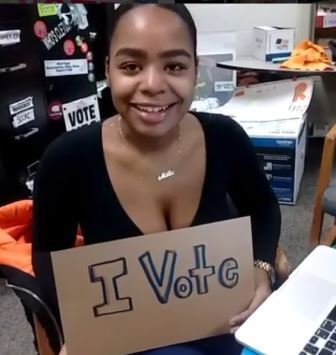Archive for the ‘Assembly District’

My college is being paid for by financial aid but it will be ending this year. I still have another year before I graduate and get my bachelors degree. Now I am faced with the fact that I need to find a way to pay for another year of school. Neither my mother nor my father earn enough to pay for my school and no entry level position I have ever had has paid me a wage where I could pay day-to-day expenses and save for school.
I am twenty-one years old and I am a proud daughter of two immigrants. My mother and father crossed the border twenty-four years ago. Today both my parents are citizens and work as truck drivers. When I was six years old my parents divorced and my mother worked night and day to pay for the food and the roof over our heads. My brother and I are the first generation of college students.



Understanding my mother’s struggle to get an education, makes it clear that I would not be able to pay for college if I did not qualify for financial aid like the Tuition Assistance Program (TAP). Although my mother’s experience differs from mine, I know if she had access to opportunity programs or financial aid to help her pay for education, she would have finished. I recently quit one of the two jobs I had at the beginning of the semester because my jobs were taking a toll on my academic performance. It is stressful to manage time when you constantly must decide on whether you need to work to have money to pay for groceries or to use that time to study for an upcoming exam
As first-generation college students, my mother always encouraged my siblings and I to continue with our education to have a financially stable future, nothing like what we experienced as children. My mother valued the little education she received in her hometown in Mexico, and wished to continue her education as a college student but like most of her neighbors, she had no money for it. Although against all odds, my mother followed her passion to learn and enrolled herself in a public college without any financial support from her parents.. She barely passed the first year and failed the following year; whenever I ask her what held her back from going back to school, she explained the lack of resources. Students should not carry such a financial burden before they are even given the chance to better themselves.



In the beginning of August, me and my mom started talking about the fall semester of college and how to pay for it. We looked at the cost and my mom was worried because it was over $8,000. I told her that the Tuition Assistance Program (TAP) would cover the costs associated with college, but not everything.
Then we drove to the college and we spoke with one of the representatives at the financial aid office. She told us “The financial aid would not cover everything”. My mom then asked “How am I supposed to pay it” and the lady said “I don’t know.” When I got home that day, my mom and I had a talk about what to do and we decided to take out loans. The problem about that is I won’t be able to work on my career because I have to find a job ASAP and work for who knows how long to pay off the loans. My career will be on hold for weeks, months, or even years.



I use financial aid to pay my tuition in college. I qualify for the Tuition Assistance Program (TAP). However, the TAP award is too low. It should be more. I have to buy books, food, and pay for transportation costs and housing.
This semester, my textbooks cost almost $300 and my metrocard costs $120 per month. Because I am a full-time student in college, it is not possible to work. I hope I am going to graduate on time so that I do not run out of TAP money.



As an Environmental Studies major, I’m happy to have the experience of pursuing my passion and learning about what I love. Paying for college is my biggest hassle. My parents “make too much” for me to be able to get financial aid so I’ve been forced to take out private and unsubsidized loans to pay my tuition. Because of the ridiculous interest rates of the private loans, I watch my balance increase every month. With each increase, I wonder how I will be able to pay these loans off and how long it will take me. As someone who wants to pursue a graduate degree, I also wonder if my current debt will affect my ability to do so and how I will pay for it. I had to take a semester off 2 years ago because of a hold on my account due to unpaid fees that I was not able to resolve in time.
Like many other students, I’ve had to get a job on campus to earn money to pay for tuition, textbooks, a monthly metrocard, buy food, and pay bills. Despite what FAFSA has determined about my family’s financial standing, depending on them to provide me with money for all these expenses is not possible, especially considering the fact that I’m one of two children currently in college. While I feel that learning to manage time is an important skill to have in college, I don’t believe that struggling to stay financially afloat is a struggle that college students should have to face. I hope to see a change in what is considered low-income and a greater and more comprehensive approach to helping students pay for education as it should be a right and not a privilege.



I am currently relying on my parents’ income to support me, but to be honest, a lower-middle class family supporting two children in college is hard. So I am forced to work in order to pay for school.
My schedule is so tight because I must work until 12 or 1 AM for a restaurant and still take a full-time course load to qualify for the Tuition Assistance Program (TAP). I am also paying for my own textbooks. As a student who majoring in biology, textbooks are a major burden on my wallet. I am also paying for my own transportation.



As a senior in high school, I did not think college would ever be in my grasp. Most of my family did not go to college so I thought I would not either. I was unsure how I would pay for my higher education. Thankfully, my high school had a terrific career program that provided the necessary tools to make my college dreams a possibility. I applied to SUNY Cortland through their Educational Opportunity Program (EOP) and was admitted. I am grateful to have come across this program. They helped me prepare for college socially and economically, as well as help me prepare in terms of academics. I receive financial aid in order to help pay for school, however a majority of the additional costs are placed on my shoulders. Aside for paying for tuition, I front the cost of other expenses such as food, social activities, toiletries, textbooks and other school supplies. The list can go on forever, As an off-campus resident, I must also pay rent. I am taking eighteen credits and also working two jobs to help me with the cost of living.
I am studying sociology and professional writing and planning on attending graduate school. I am an aspiring counselor and believe that the investment for a postgraduate degree will increase my chances of employment, and ultimately allow me to pay off loans more efficiently.



I pay for my tuition entirely out of pocket with no financial support from my family. I was forced to drop out of my four year public college because my family fell on hard financial times and TAP didn’t cover enough of my outstanding tuition costs. I worked for four years in order to afford to send myself back to school.
Even now, I am constantly at risk of having to leave school again because of financial reasons. I’ve had to choose between buying textbooks and buying groceries, and I’ve frequently gone hungry in order to make timely payments towards my education. Because of my independent status and other factors, I don’t qualify for any financial aid, state or federal. I will be transferring to a four year public college next semester, but without financial assistance from the state, my future at that school is uncertain.



I am a resident of Brooklyn, NY and go to the Pratt Institute of Art and Design. My family is unable to afford higher education by itself. Pratt has one of the highest college tuition rates and although it is a private school its students do get help from special programs such as the Higher Education Opportunity Program (HEOP). Without this program, it would be impossible for me and for many other people to afford higher education. Currently I have two part time jobs, which interfere with my schooling.
I am also worried about my future financially when I get out of college. It is hard to focus on schoolwork when finances are an issue, and it is especially hard knowing your parents back home are struggling to secure a future for their child. Funding for education is funding for the future, and I don’t think any person should have to struggle and worry about their future. I do not want others to worry and struggle like my family does. If New York does not fund higher education, they are endangering the future for everyone. Education should be given to anyone who has the desire to learn, regardless of their ability to pay. Please, set an example for the rest of the country and the world by funding higher education.



My name is Carola and I’m a foreign student studying at Pratt from Australia. Being thousands of kilometers away means that I have to sustain myself here. College affordability for me means having enough money to be flexible and make the most of my experience living in New York. Most importantly this means being able to deal with unexpected expenses such as losing an important item, getting sick or taking a cab home when it does not feel safe to catch the public transport. With the cost of art supplies, textbooks and the basic cost of living so high it can feel like you have very little flexibility and even the smaller expenses can easily lead to a lot of anxiety about being able to make ends meet.










